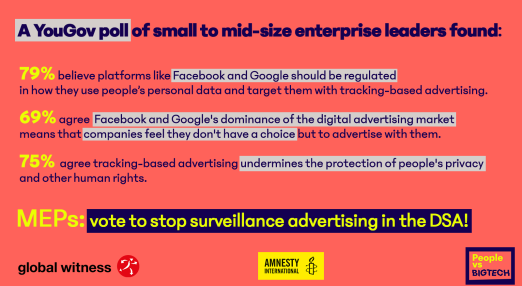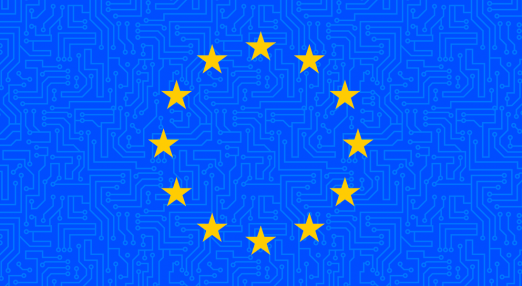adtech
Filter by...
-

Don’t let Big Tech fool you: Small businesses don’t want surveillance advertising
Tracking-based advertising has become all pervasive in the digital world. Amnesty Tech's new research shows that small businesses know very well how harmful these practices are to human rights but have little alternative.
Read more
-

Booklet: Informing the disinfo debate
Today, 20 December 2021, EDRi, Access Now and Civil Liberties Union for Europe publish a joint report as a continuation of its 2018 predecessor, Informing the “Disinformation” Debate. The main outcome of this report is a set of policy recommendations addressed to the EU co-legislators focusing on: how to effectively mitigate fundamental rights risks that result from the manipulative methods deployed by large online platforms that exploit people’s vulnerabilities and their sensitive data; and how to combat disinformation in a manner that is fully compliant with fundamental rights standards.
Read more
-

Press “Accept” to let companies know every step you take
When you download a free app and accept their privacy statement, did you know that you may just have allowed data about your movement to be sold freely to anyone who’s willing to pay? EDRi's member Elektronisk Forpost Norge (EFN) shares more.
Read more
-

noyb publishes the draft decision by the DPC in the case against Facebook
The Irish Data Protection Commission (DPC) has sent a draft decision to EDRi's member noyb - European Center for Digital Rights and informed noyb that the draft decision would be shared with the other European Data Protection Authorities for consultation. The case concerns Facebook's reliance on contracts for serving advertising to its users - the legal trick Facebook applied in May 2018 to bypass the GDPR.
Read more
-

Can the EU Digital Services Act contest the power of Big Tech’s algorithms?
A progressive report on the Digital Services Act (DSA) adopted by the Committee on Civil Liberties, Justice and Home Affairs (LIBE) in the European Parliament in July is the first major improvement of the draft law presented by the European Commission in December. MEPs expressed support for default protections from tracking and profiling for the purposes of advertising and recommending or ranking content. Now the ball is in the court of the leading committee on internal market and consumer protection (IMCO), which received 1313 pages of amendments to be voted in November. EDRi's member Panoptykon Foundation explores if the Parliament would succeed in adopting a position that will contest the power of dominant online platforms which shape the digital public sphere in line with their commercial interests, at the expense of individuals and societies.
Read more
-

All hands on deck: What the European Parliament should do about the DSA
After the European Commission’s proposal for a Digital Services Act (DSA) in December 2020, no less than seven committees in the European Parliament are now drafting their reports and opinions on the DSA. In parallel, member states are deliberating about the Council’s position, too. Yet, while the Commission has carefully tried to modernise the ageing rules of the E-Commerce Directive and make them fit for the platform economy, several of the committees’ draft reports propose—deliberately or not—to turn the DSA into a dystopian fundamental rights nightmare.
Read more
-

EDRi joins the Tracking-Free Ads Coalition in the European Parliament
Today, European Digital Rights (EDRi) together with 25+ other organisations joins the Tracking-Free Ads Coalition, led by Members of the European Parliament, as supporters. The coalition is made up of a group of 19 Members of European Parliament committed to ending the pervasive tracking and data mining that has poisoned online advertising across every corner of the internet.
Read more
-

DSA should promote open and fair digital environment, not undermine the rule of law
The Rapporteur of the European Parliament Committee leading one of the most important legal initiatives to regulate platforms has spoken. The Internal Market and Consumer Protection (IMCO) Committee's draft report on the Digital Services Act (DSA) turns online platforms into judge, jury and executioner when it comes to removing online content. This follows the same logic as the Copyright Guidelines that were presented last week. It also gives vast powers to the European Commission and national governments to suppress opposing voices.
Read more
-

FLoC: Google’s new means of following you across the web
If you browse the web without an ad blocker, you will have noticed that the ads you see tend to follow you around. Have you been looking around for a new pair of shoes? Be prepared to see more ads for shoes on completely unrelated websites. This advertising technique is called "behavioural retargeting" and is built on recording your web history in a central place, then using that information to select ads that advertisers expect you are more likely to react to. In this article. EDRi's member epicenter.works sheds some light on Google's new way of tracking users across the web.
Read more
-

AdTech is watching you!
The reality is that AdTech target mothers who just had stillbirths with baby ads, and serial gamblers who are trying to quit with gambling ads, or simply send creepy ads.
Read more
-

Booklet: Surveillance-based advertising: An industry broken by design and by default
Most online advertising today relies on huge amounts of personal data extracted from people without their knowledge. EDRi’s new guide book “Targeted Online” sheds light on this opaque data industry and explores how EU law should regulate it. This is the first blog post in a new series dedicated to the EU’s proposed Digital Services Act and Digital Markets Act.
Read more
-

The EU’s attempt to regulate Big Tech: What it brings and what is missing
This week, the European Commission has proposed two long-awaited pieces of digital legislation, the Digital Services Act and the Digital Markets Act. Despite a number of good provisions, there are also major shortcomings which must be addressed to guarantee the protection of digital rights.
Read more
